人教版六年级一般将来时练习题
六年级英语一般将来时句型练习题40题含答案解析

六年级英语一般将来时句型练习题40题含答案解析1.She is going to________a book tomorrow.A.readB.readsC.reading答案解析:A。
“be going to”后面跟动词原形,选项B 是第三人称单数形式,选项C 是动名词形式,只有选项A 是动词原形。
2.They are going to________a picnic this weekend.A.haveB.hasC.having答案解析:A。
“be going to”后面跟动词原形,选项B 是第三人称单数形式,选项C 是动名词形式,只有选项A 是动词原形。
3.I am going to________my homework tonight.A.doB.doesC.doing答案解析:A。
“be going to”后面跟动词原形,选项B 是第三人称单数形式,选项C 是动名词形式,只有选项A 是动词原形。
4.We are going to________a movie next Sunday.A.seeB.sees答案解析:A。
“be going to”后面跟动词原形,选项B 是第三人称单数形式,选项C 是动名词形式,只有选项A 是动词原形。
5.He is going to________a football match tomorrow.A.watchB.watchesC.watching答案解析:A。
“be going to”后面跟动词原形,选项B 是第三人称单数形式,选项C 是动名词形式,只有选项A 是动词原形。
6.My sister is going to________a birthday party next week.A.haveB.hasC.having答案解析:A。
“be going to”后面跟动词原形,选项B 是第三人称单数形式,选项C 是动名词形式,只有选项A 是动词原形。
(完整)六年级英语一般将来时练习

六年级英语一般将来时练习(1)将来时;_________________________________________二. 用所给动词的正确形式填空1.I (do) my homework tonight.2.We (water) the flowers this afternoon.3.He (buy) a CD next Saturday.4.You (read) books on the weekend.5.They (go) the cinema this evening.6.My parents (fly) to Beijing tomorrow.7.Mike (watch )TV this evening.8.Amy (have) a busy weekend.9.Lily (read) books on Saturday morning.10.Tom and Jack (watch )TV on Saturday afternoon.11.She (go )shopping on Sunday morning.12.He (play) football this afternoon.13. I (go)hiking this afternoon.三. 改一般疑问句和否定句, 并作否定回答和肯定回答。
1...........................?I am going to visit my grandparents this weekend.2...........................?He is going to the school tomorrow. 3...........................?They are going to the library. 4...........................?we are going to plant trees this weekend. 5...........................?Mike is going to watch TV this evening.6.Liu Yun is going to read books this Saturday.7.John is going to the theme park this weekend.8.She is going next Tuesday.9. Sarah is going to be an English teacher one day.四、划线部分提问(常用疑问词: what, where, when, how, who)1.A:___________________________________________B: I’m going to visit my grandparents this weekend.2.A:_________________________________________B: I’m going to the bookstore this afternoon.3. A:________________________________________ B: My father is going to Beijing with me.4.A:___________________________________________ B: He’s going to plant trees this weekend.5:A:___________________________________________ B: I’m going to the park at 3 o’cloc k.6.A:___________________________________________ B: My sister is going to visit the Great Wall next year.7.A:___________________________________________ B:T hey’re going to the zoo tomorrow.8.A:___________________________________________ B: Tom and John are going to take a trip this weekend.9A:___________________________________________ B:They are going to Shanghai by plane.10.A:___________________________________________? B:she is going to buy a book on the weekend11.A:___________________________________________? B:she is going to buy a book on the weekend 12. .A:_____________________________B:We are going to take a trip tomorrow.13. A:________________________________B: Sarah is going to buy a comic book .14. A:________________________________.B: They are going to the cinema this evening.15. A: __________________________________B: Mike is going to the park next week.16. A: __________________________________B: I’m going to the zoo by bike.17. A: _________________________________B: Yes, I am going to read books tonight.18. A: _________________________________B: she is going to play basketball after school.19. A:__________________________________B: I go there on foot.五.根据答句写问句1.A:____________________________________________?B:I’m going to visit my grandparents on the weekend 2.A:____________________________________________? B:We are going to go hiking this afternoon.3.A:____________________________________________? B:Mike is going to watch TV this evening.4.A:____________________________________________? B:Liu Yun is going to read books this Saturday.5.A:____________________________________________? B:They are going to take a trip next week.6.A:____________________________________________? B: I’m going to the bookstore tomorrow.7.A:____________________________________________? B: We are going to the cinema this evening.8.A:____________________________________________? B: John is going to the theme park this weekend.9.A:____________________________________________? B: They are going to the Great Wall next month.10.A:__________________________________________? B:I’m going at 2:30.11.A:_________________________________________ ? B:I am going to visit my grandparents this weekend.12.A:_________________________________________? B:He is going to the cinema this afternoon.13.A:________________________________________? B:She is going next Tuesday.14.A:_________________________________________? B:They are going to Shanghai by plane.15.A:_________________________________________? B:Mike and Amy are going to the Great Wall this weekend.16.A:_________________________________________? B:She wants to be a science teacher in the future.17.A:_________________________________________? B:Sarah is going to be an English teacher one day.18.A:___________________________________________? B:Mary is going at 8:10.19.A:___________________________________________? B:They are going at 9:25.20.A:___________________________________________?B:I’m going to the hospital by bus.21.A:________________________________________?B: We are going to the post office on foot.22.A:________________________________________?B:Amy is going to the library by bike.23.A:________________________________________?B: They are going to the shoe store by car.24.A:________________________________________?B:Yes.I’m going to the hospital by bus.25.A:________________________________________?B:No.We are going to the post office on foot.26.A:_________________________________________B:Yes.Amy is going to the library by bike.27.A:________________________________________?B:No.They are going to the shoe store by car.六、短文填空。
【人教版】六年级上Unit8一般将来时专项练习

【人教版】六年级上Unit8一般将来时专项练习1. 将来时的基本用法:将来时表示将来要发生的动作或存在的状态。
常见的将来时形式有:- be going to + 动词原形:表示打算、计划或判断将来要发生的事情。
- will + 动词原形:表示将来临时、意外的决定或预测。
2. 将来时练题:1) I _____ (go) to the movies with my friends this weekend.2) He _____ (have) a birthday party next Saturday.3) We _____ (visit) ___.4) They _____ (buy) a new car next month.5) She _____ (not cook) dinner tonight.6) _____ you _____ (help) me with my homework later?7) My parents _____ (travel) ___.8) We _____ (not see) each other again after this semester.9) _____ they _____ (attend) the meeting tomorrow?10) He _____ (play) football in the park this Sunday.3. 将来时练答案:1) am going to go2) will have3) are going to visit4) will buy5) will not cook6) Are, going to help7) will travel8) will not see9) Are, going to attend10) will play以上是【人教版】六年级上Unit8一般将来时专项练习的内容,希望能对你有所帮助。
六年级英语一般将来时练习题20题含答案解析

六年级英语一般将来时练习题20题含答案解析1.She ____ visit her grandparents this weekend.A.willB.is going toC.was going toD.visited答案解析:A 和 B 都可以表示一般将来时。
C 是过去将来时,不符合题意。
D 是一般过去时,也不符合题意。
this weekend 表示将来的时间,根据选项可知,A 和B 都有可能。
“will + 动词原形”和“be going to + 动词原形”都可以表示将来发生的动作或存在的状态,但“be going to”表示根据目前的迹象或计划将要发生的事情,而“will”则表示临时决定或意愿。
在这个句子中,没有明确的迹象表明她是有计划地去看望祖父母,所以A 和B 都可以,但A 更符合一般将来时的基本结构,所以答案是A。
2.We ____ have a picnic tomorrow if the weather is fine.A.willB.are going toC.hadD.have答案解析:A 和B 都可以表示一般将来时。
C 是过去时,D 是现在时,都不符合题意。
tomorrow 表示将来的时间,根据选项可知,A 和B 都有可能。
“will + 动词原形”和“be going to + 动词原形”都可以表示将来发生的动作或存在的状态,但“be going to”表示根据目前的迹象或计划将要发生的事情,而“will”则表示临时决定或意愿。
在这个句子中,如果天气好,我们去野餐,这是一种临时决定,所以A 更符合题意,答案是A。
3.My brother ____ be a doctor when he grows up.A.willB.is going toC.wasD.is答案解析:A 和B 都可以表示一般将来时。
C 是过去时,D 是现在时,都不符合题意。
when he grows up 表示将来的时间,根据选项可知,A 和B 都有可能。
(完整版)小学六年级英语一般将来时练习
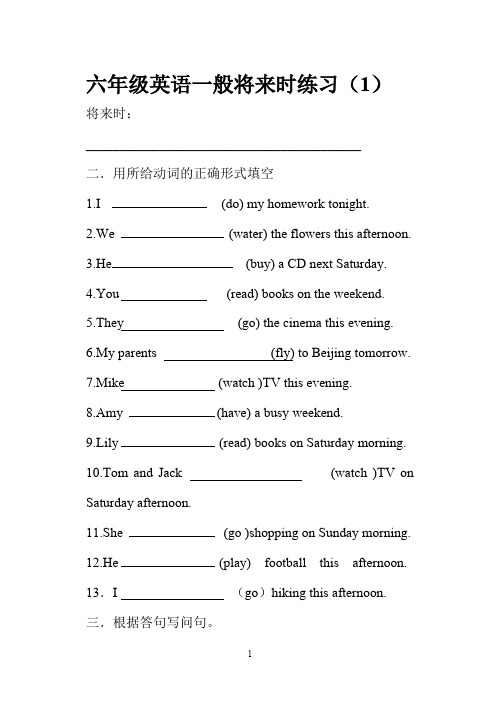
六年级英语一般将来时练习(1)将来时;_________________________________________二.用所给动词的正确形式填空1.I (do) my homework tonight.2.We (water) the flowers this afternoon.3.He (buy) a CD next Saturday.4.You (read) books on the weekend.5.They (go) the cinema this evening.6.My parents (fly) to Beijing tomorrow.7.Mike (watch )TV this evening.8.Amy (have) a busy weekend.9.Lily (read) books on Saturday morning.10.Tom and Jack (watch )TV on Saturday afternoon.11.She (go )shopping on Sunday morning.12.He (play) football this afternoon. 13.I (go)hiking this afternoon.三.根据答句写问句。
1. ?I am going to visit my grandparents this weekend.2. ? He is going to the school tomorrow.3. ? They are going to the library.4. ? we are going to plant trees this weekend.5. ? Mike is going to watch TV this evening.6. ? Liu Yun is going to read books this Saturday.7. ? John is going to the theme park this weekend.8. ? She is going next Tuesday.9. ? Sarah is going to be an English teacher one day.四、划线部分提问(常用疑问词:what, where, when, how, who)1.A:___________________________________________ B: I’m going to visit my grandparents this weekend.2.A:_________________________________________B: I’m going to the bookstore this afternoon.3.A:________________________________________ B: My father is going to Beijing with me.4.A:___________________________________________ B: He’s going to plant trees this weekend.5:A:___________________________________________ B: I’m going to the park at 3 o’clock.6.A:___________________________________________ B: My sister is going to visit the Great Wall next year.7.A:___________________________________________ B:They’re going to the zoo tomorrow.8.A:___________________________________________ B: Tom and John are going to take a trip this weekend.9A:___________________________________________ B:They are going to Shanghai by plane.10.A:___________________________________________? B:she is going to buy a book on the weekend11.A:___________________________________________?B:she is going to buy a book on the weekend 12..A:_____________________________B:We are going to take a trip tomorrow.13.A:________________________________B: Sarah is going to buy a comic book .14.A:________________________________.B: They are going to the cinema this evening.15.A: __________________________________B: Mike is going to the park next week.16.A: __________________________________B: I’m going to the zoo by bike.17.A: _________________________________B: Yes, I am going to read books tonight.18.A: _________________________________B: she is going to play basketball after school.19.A:__________________________________B: I go there on foot.五.根据答句写问句1.A:____________________________________________? B:I’m going to visit my grandparents on the weekend2.A:____________________________________________? B:We are going to go hiking this afternoon.3.A:____________________________________________? B:Mike is going to watch TV this evening.4.A:____________________________________________? B:Liu Yun is going to read books this Saturday.5.A:____________________________________________? B:They are going to take a trip next week.6.A:____________________________________________? B: I’m going to the bookstore tomorrow.7.A:____________________________________________? B: We are going to the cinema this evening.8.A:____________________________________________? B: John is going to the theme park this weekend.9.A:____________________________________________? B: They are going to the Great Wall next month.10.A:__________________________________________? B:I’m going at 2:30.11.A:_________________________________________ ?B:I am going to visit my grandparents this weekend.12.A:_________________________________________? B:He is going to the cinema this afternoon.13.A:________________________________________? B:She is going next Tuesday.14.A:_________________________________________? B:They are going to Shanghai by plane.15.A:_________________________________________? B:Mike and Amy are going to the Great Wall this weekend.16.A:_________________________________________? B:She wants to be a science teacher in the future.17.A:_________________________________________? B:Sarah is going to be an English teacher one day.18.A:___________________________________________?B:Mary is going at 8:10.19.A:___________________________________________?B:They are going at 9:25.20.A:___________________________________________?B:I’m going to the hospital by bus.21.A:________________________________________?B: We are going to the post office on foot.22.A:________________________________________?B:Amy is going to the library by bike.23.A:________________________________________?B: They are going to the shoe store by car.24.A:________________________________________?B:Yes.I’m going to the hospital by bus.25.A:________________________________________?B:No.We are going to the post office on foot.26.A:_________________________________________B:Yes.Amy is going to the library by bike.27.A:________________________________________?B:No.They are going to the shoe store by car.六、短文填空。
六年级英语一般将来时单选题40题
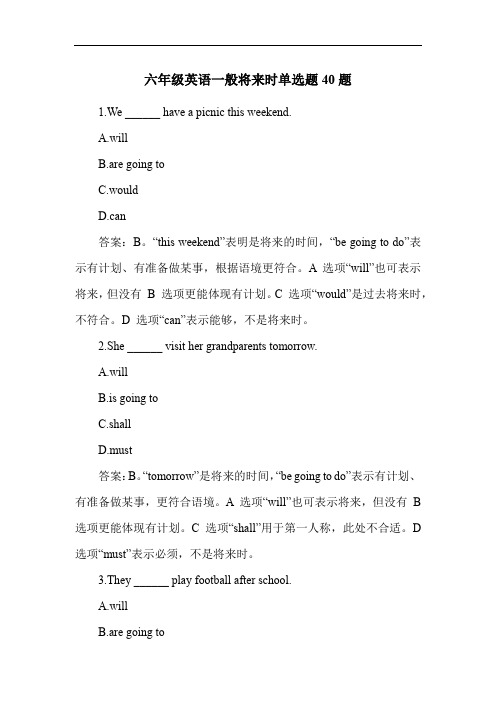
六年级英语一般将来时单选题40题1.We ______ have a picnic this weekend.A.willB.are going toC.wouldD.can答案:B。
“this weekend”表明是将来的时间,“be going to do”表示有计划、有准备做某事,根据语境更符合。
A 选项“will”也可表示将来,但没有B 选项更能体现有计划。
C 选项“would”是过去将来时,不符合。
D 选项“can”表示能够,不是将来时。
2.She ______ visit her grandparents tomorrow.A.willB.is going toC.shallD.must答案:B。
“tomorrow”是将来的时间,“be going to do”表示有计划、有准备做某事,更符合语境。
A 选项“will”也可表示将来,但没有B 选项更能体现有计划。
C 选项“shall”用于第一人称,此处不合适。
D 选项“must”表示必须,不是将来时。
3.They ______ play football after school.A.willB.are going toC.mayD.should答案:B。
“after school”表示将来的时间,“be going to do”表示有计划、有准备做某事,更符合语境。
A 选项“will”也可表示将来,但没有B 选项更能体现有计划。
C 选项“may”表示可能,不是将来时。
D 选项“should”表示应该,不是将来时。
4.I ______ buy a new book next week.A.willB.am going toC.canD.might答案:B。
“next week”表示将来的时间,“be going to do”表示有计划、有准备做某事,更符合语境。
A 选项“will”也可表示将来,但没有B 选项更能体现有计划。
C 选项“can”表示能够,不是将来时。
六年级英语一般将来时单选题 30 题

六年级英语一般将来时单选题30 题1.We _____ have a picnic this weekend.A.willB.are going toC.will beD.are答案解析:B。
A 选项“will”表示单纯的将来,B 选项“be going to”表示有计划、有打算的将来,这里“this weekend”表示有一定计划的周末野餐,所以用“be going to”更合适。
C 选项“will be”后面缺少表语,D 选项“are”后面缺少动词的现在分词形式,不能表示将来时。
2.My family _____ visit the zoo tomorrow.A.willB.is going toC.are going toD.will be答案解析:C。
“my family”在这里表示家人,是复数概念,所以后面用“are going to”。
A 选项“will”可以表示将来,但没有突出计划性。
B 选项“is going to”用于单数主语。
D 选项“will be”后面缺少表语。
3.I _____ play football after school.A.willB.am going toC.will beD.am答案解析:B。
有明确的计划放学后踢足球,用“be going to”更合适。
A 选项“will”也可以,但不如“be going to”体现计划性。
C 选项“will be”后面缺少表语。
D 选项“am”后面缺少动词的现在分词形式,不能表示将来时。
4.She _____ buy a new dress next week.A.willB.is going toC.will beD.is答案解析:B。
有明确的打算下周买新裙子,用“be going to”。
A 选项“will”单纯表示将来,不如“be going to”有计划性。
C 选项“will be”后面缺少表语。
D 选项“is”后面缺少动词的现在分词形式,不能表示将来时。
六年级英语一般将来时句型单选题40题

六年级英语一般将来时句型单选题40题1.We will go to the park tomorrow.A.go to the zooB.go to schoolC.stay at home答案:A。
本题中“We will go to the park tomorrow.”表示明天我们将去公园。
选项A 是去动物园,与去公园不同的活动地点,符合一般将来时的不同活动计划;选项B 去学校和题干去公园活动地点不同,但不是日常活动计划的比较;选项C 待在家里与去公园活动方式不同,也不是日常活动计划的比较。
2.I will read a book after dinner.A.watch TVB.do homeworkC.play games答案:B。
“I will read a book after dinner.”表示晚饭后我将读书。
选项B 做作业与读书都是学习相关活动,符合一般将来时的日常活动计划;选项A 看电视与读书活动性质不同;选项C 玩游戏与读书活动不同。
3.They will visit their grandparents next week.A.visit friendsB.go shoppingC.study at home答案:A。
“They will visit their grandparents next week.”下周他们将看望祖父母。
选项 A 看望朋友与看望祖父母都是社交活动,符合一般将来时日常活动计划;选项B 去购物活动不同;选项C 在家学习与看望祖父母活动不同。
4.She will sing a song at the party.A.danceB.tell a storyC.draw a picture答案:B。
“She will sing a song at the party.”她将在聚会上唱歌。
选项B 讲故事与唱歌都是在聚会上的表演活动,符合一般将来时日常活动计划;选项A 跳舞与唱歌活动不同;选项C 画画与唱歌活动不同。
小学英语六年级语法专项练习:一般将来时
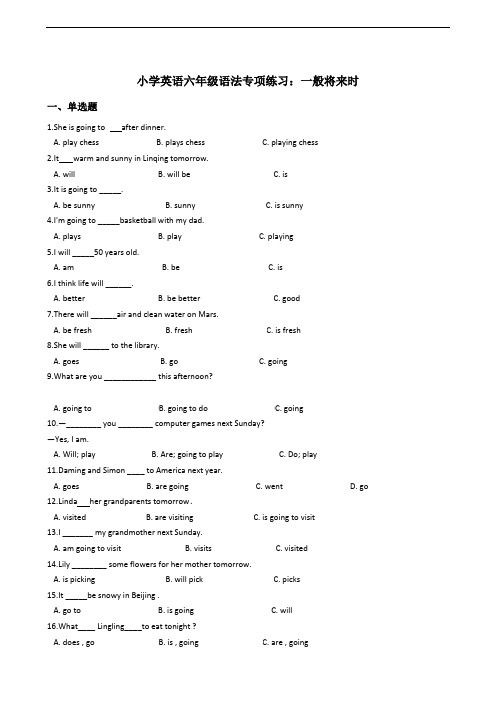
小学英语六年级语法专项练习:一般将来时一、单选题1.She is going to after dinner.A. play chessB. plays chessC. playing chess2.It warm and sunny in Linqing tomorrow.A. willB. will beC. is3.It is going to _____.A. be sunnyB. sunnyC. is sunny4.I'm going to _____basketball with my dad.A. playsB. playC. playing5.I will _____50 years old.A. amB. beC. is6.I think life will ______.A. betterB. be betterC. good7.There will ______air and clean water on Mars.A. be freshB. freshC. is fresh8.She will ______ to the library.A. goesB. goC. going9.What are you ____________ this afternoon?A. going toB. going to doC. going10.—________ you ________ computer games next Sunday?—Yes, I am.A. Will; playB. Are; going to playC. Do; play11.Daming and Simon ____ to America next year.A. goesB. are goingC. wentD. go12.Linda her grandparents tomorrow.A. visitedB. are visitingC. is going to visit13.I _______ my grandmother next Sunday.A. am going to visitB. visitsC. visited14.Lily ________ some flowers for her mother tomorrow.A. is pickingB. will pickC. picks15.It _____be snowy in Beijing .A. go toB. is goingC. will16.What____ Lingling____to eat tonight ?A. does , goB. is , goingC. are , going17.Where are we ______?A. goB. goesC. going18.—What are you going to do this afternoon?—A. I'm going to play basketball.B. I'm a student.C. I'm doing homework.19.Miss Li ________to Beijing for a meeting next Monday.A. wentB. goesC. will go20.We ________ a Christmas card ________ our good friend tomorrow.A. send; forB. write; toC. are going to write; to21.— What ______ you going to do?— I _____ going to dance with the music.A. is, amB. are, isC. are, am22.— ______ he going to visit his uncle next week?—Yes, he will.A. DoesB. IsC. Will二、判断题23.David is going to buy his favourite comic book.24.I will be a doctor. (判断语句是否正确)25.Will you a math teacher? (判断语句是否正确)26.What will you do to Mom?27.I'll give her a card.28.Are you going home?29.We'll thirsty.30.What are you going to took with you?三、填空题31.—What________you________(do) tomorrow, Lily?32.—I'll________(see) a film in the morning. Then I'll________(play) football in the afternoon.33.________(be) there many trees in this forest in the past?34.—Yes, there________(be). But now there________(be) not many trees.35.—________people________(plant) more trees in the future?—I don't know.36.They are going to________ ( stay ) in Beijing.37.Jing ________( go to ) the Great Wall tomorrow.38.My friend ________ the play yesterday. I ________ it tomorrow. (see)39.They ________(plant) trees tomorrow.40.I ________(fly)kites tomorrow .41.I'm going to ________(visit)Beijing .42.How long will we________(stay)in Sanya?43.He ________ (fly) a kite with his friends tomorrow.四、语法填空41.阅读短文, 用所给词的正确形式填空Hi, I am Simon. I________ (write) a letter to my cousin, Daming now. I________ (come) from the US. But Daming is from China. He often ________ (tell) me lots of funny things about China. And I like ________ (read) books about China, too. There________ (be) lots of delicious food and beautiful places in china. I want________ (go) to China. So last year I ________ (go) to China and ________ (visit) many beautiful places in China. I was very happy. Daming asks me ________ (meet) him in China again. So I ________ (go) to China next year again.五、句型转换42.They are going to have a birthday party this weekend. (改为同义句)They ________ ________a birthday party this weekend.43.I'm going to read books this evening. (改为一般疑问句并做否定回答)________ you________ ________read books this evening?No, ________ ________.44.They are playing football now. (用tomorrow替换now)They________ ________ football tomorrow.45.I'll cook fish. (改为一般疑问句)________ you ________ fish?46.I will go fishing this weekend. (改为否定句)I________ ________ ________fishing this weekend.47.We will go to the supermarket this aftermoon.(把this afternoon改为every afternoon)We ________ ________ the supermarket every afternoon.48.Mike is going to take a gift tomorrow. (对划线部分提问)________ is Mike going to ________ tomorrow?49.My mother told me a story yesterday? (用be going to改写句子)My mother ________going to ________ me a story.六、翻译50.迈克将会回伦敦。
六年级英语一般将来时单选题30题

六年级英语一般将来时单选题30题1.We _____ a picnic this weekend.A.will haveB.haveC.hasD.had答案:A。
“this weekend”表明是将来的时间,要用一般将来时,will+动词原形,所以选A。
B 是一般现在时,C 也是一般现在时且主语是第三人称单数才用,D 是一般过去时。
2.I _____ visit my grandparents tomorrow.A.willB.am going toC.wasD.am答案:B。
“tomorrow”表示将来,be going to+动词原形表示计划打算做某事,这里“visit”是动词原形,所以选B。
A 选项will 后面也可以加动词原形,但相比之下be going to 更强调计划打算;C 是一般过去时;D am 后面缺少动词的-ing 形式表示现在进行时或者缺少going to 和动词原形表示一般将来时。
3.They _____ play football next Sunday.A.willB.are going toC.wereD.are答案:B。
“next Sunday”是将来的时间,be going to+动词原形,they 是复数,be 动词用are,所以选B。
A 选项will 后面也可以加动词原形,但be going to 更强调有迹象表明要做某事;C 是一般过去时;D are 后面缺少going to 和动词原形。
4.My mother _____ cook dinner tonight.A.willB.is going toC.cooksD.cooked答案:B。
“tonight”表示今晚,是将来的时间,be going to+动词原形,my mother 是第三人称单数,be 动词用is,所以选B。
A 选项will 后面也可以加动词原形,但be going to 更强调根据现在的情况判断将来;C 是一般现在时;D 是一般过去时。
六年级英语一般将来时练习题50题
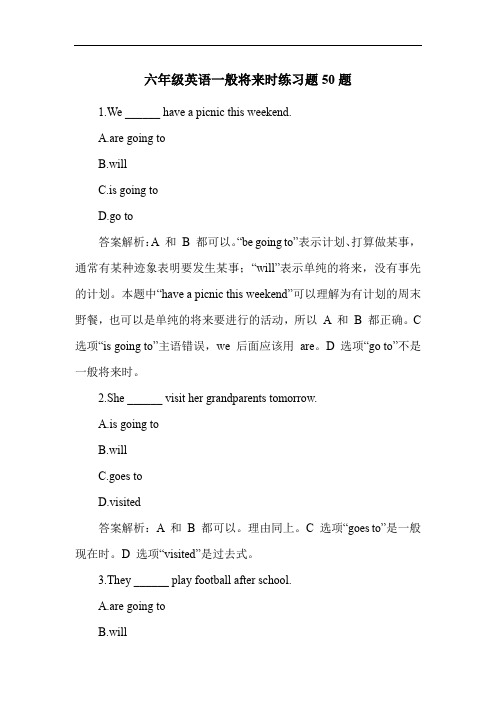
六年级英语一般将来时练习题50题1.We ______ have a picnic this weekend.A.are going toB.willC.is going toD.go to答案解析:A 和B 都可以。
“be going to”表示计划、打算做某事,通常有某种迹象表明要发生某事;“will”表示单纯的将来,没有事先的计划。
本题中“have a picnic this weekend”可以理解为有计划的周末野餐,也可以是单纯的将来要进行的活动,所以A 和B 都正确。
C 选项“is going to”主语错误,we 后面应该用are。
D 选项“go to”不是一般将来时。
2.She ______ visit her grandparents tomorrow.A.is going toB.willC.goes toD.visited答案解析:A 和B 都可以。
理由同上。
C 选项“goes to”是一般现在时。
D 选项“visited”是过去式。
3.They ______ play football after school.A.are going toB.willC.are playingD.play答案解析:A 和B 都可以。
“play football after school”可以是计划好的,也可以是单纯的将来动作。
C 选项“are playing”是现在进行时。
D 选项“play”是一般现在时。
4.I ______ read a book tonight.A.am going toB.willC.readD.am reading答案解析:A 和B 都可以。
“read a book tonight”可以是计划,也可以是单纯的将来。
C 选项“read”是一般现在时。
D 选项“am reading”是现在进行时。
5.We ______ go to the park if it is sunny.A.are going toB.willC.goD.went答案解析:A 和B 都可以。
六年级英语一般将来时特殊用法练习题50题(带答案)
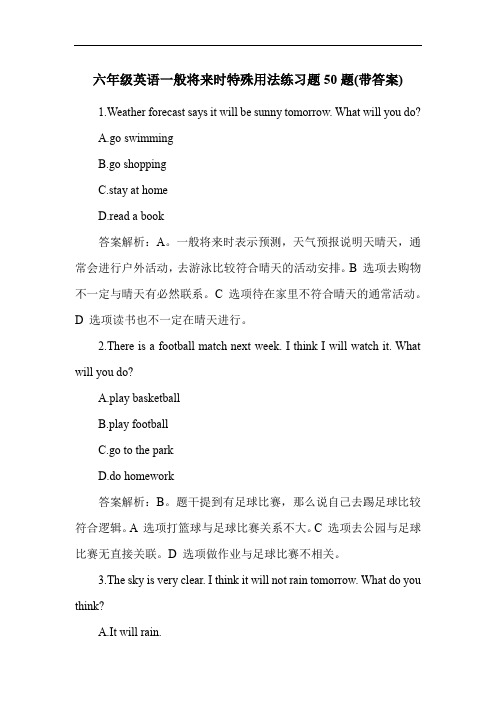
六年级英语一般将来时特殊用法练习题50题(带答案)1.Weather forecast says it will be sunny tomorrow. What will you do?A.go swimmingB.go shoppingC.stay at homeD.read a book答案解析:A。
一般将来时表示预测,天气预报说明天晴天,通常会进行户外活动,去游泳比较符合晴天的活动安排。
B 选项去购物不一定与晴天有必然联系。
C 选项待在家里不符合晴天的通常活动。
D 选项读书也不一定在晴天进行。
2.There is a football match next week. I think I will watch it. What will you do?A.play basketballB.play footballC.go to the parkD.do homework答案解析:B。
题干提到有足球比赛,那么说自己去踢足球比较符合逻辑。
A 选项打篮球与足球比赛关系不大。
C 选项去公园与足球比赛无直接关联。
D 选项做作业与足球比赛不相关。
3.The sky is very clear. I think it will not rain tomorrow. What do you think?A.It will rain.B.It will be cloudy.C.It will be sunny.D.It will snow.答案解析:C。
天空很清晰,通常预示着晴天。
A 选项与题干中不会下雨但不一定会下雨矛盾。
B 选项与天空清晰不符。
D 选项没有任何迹象表明会下雪。
4.Mom says we will go on a picnic if it is fine on Sunday. What will you take?A.booksB.toysC.foodD.pens答案解析:C。
去野餐通常会带食物。
六年级英语一般将来时特殊用法练习题50题含答案解析
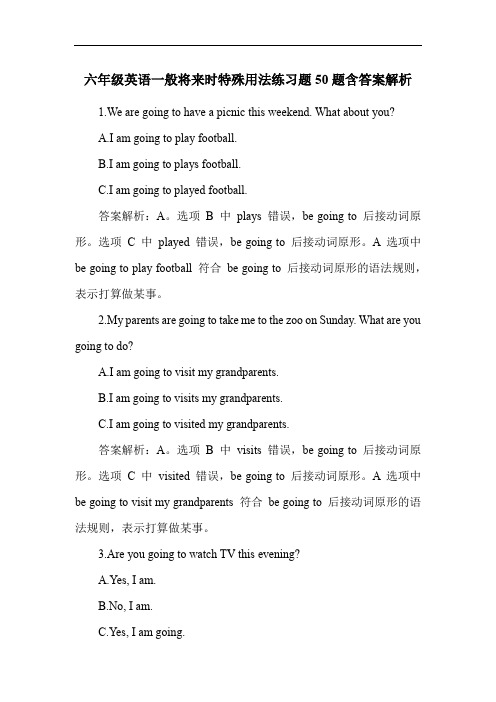
六年级英语一般将来时特殊用法练习题50题含答案解析1.We are going to have a picnic this weekend. What about you?A.I am going to play football.B.I am going to plays football.C.I am going to played football.答案解析:A。
选项B 中plays 错误,be going to 后接动词原形。
选项C 中played 错误,be going to 后接动词原形。
A 选项中be going to play football 符合be going to 后接动词原形的语法规则,表示打算做某事。
2.My parents are going to take me to the zoo on Sunday. What are you going to do?A.I am going to visit my grandparents.B.I am going to visits my grandparents.C.I am going to visited my grandparents.答案解析:A。
选项B 中visits 错误,be going to 后接动词原形。
选项C 中visited 错误,be going to 后接动词原形。
A 选项中be going to visit my grandparents 符合be going to 后接动词原形的语法规则,表示打算做某事。
3.Are you going to watch TV this evening?A.Yes, I am.B.No, I am.C.Yes, I am going.答案解析:A。
选项B 表达错误。
选项C 不完整,正确回答是Yes, I am.或者No, I'm not. A 选项符合一般疑问句的回答方式。
六年级英语一般将来时练习题50题
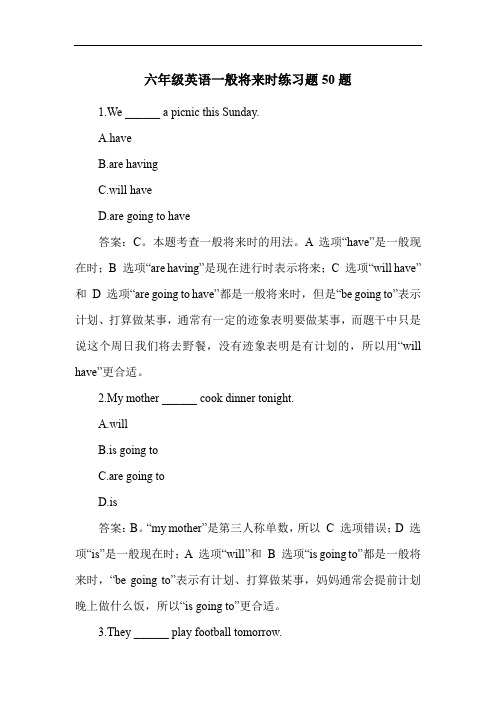
六年级英语一般将来时练习题50题1.We ______ a picnic this Sunday.A.haveB.are havingC.will haveD.are going to have答案:C。
本题考查一般将来时的用法。
A 选项“have”是一般现在时;B 选项“are having”是现在进行时表示将来;C 选项“will have”和D 选项“are going to have”都是一般将来时,但是“be going to”表示计划、打算做某事,通常有一定的迹象表明要做某事,而题干中只是说这个周日我们将去野餐,没有迹象表明是有计划的,所以用“will have”更合适。
2.My mother ______ cook dinner tonight.A.willB.is going toC.are going toD.is答案:B。
“my mother”是第三人称单数,所以C 选项错误;D 选项“is”是一般现在时;A 选项“will”和B 选项“is going to”都是一般将来时,“be going to”表示有计划、打算做某事,妈妈通常会提前计划晚上做什么饭,所以“is going to”更合适。
3.They ______ play football tomorrow.A.willB.are going toC.is going toD.will be答案:A。
“they”是第三人称复数,C 选项错误;D 选项“will be”后面缺少动词;A 选项“will”和B 选项“are going to”都是一般将来时,这里只是说他们明天要踢足球,没有迹象表明是有计划的,所以“will”更合适。
4.I ______ visit my grandparents next week.A.willB.am going toC.are going toD.will be答案:A。
“I”后面跟“am”,C 选项错误;D 选项“will be”后面缺少动词;A 选项“will”和B 选项“am going to”都是一般将来时,这里只是说我下周要去看望我的祖父母,没有迹象表明是有计划的,所以“will”更合适。
(完整版)小学英语一般将来时练习
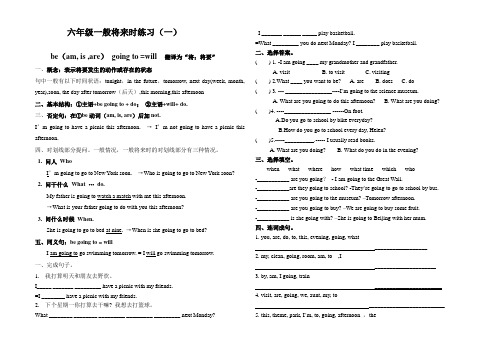
六年级一般将来时练习(一)be(am, is ,are)going to =will 翻译为“将;将要”一、概念:表示将要发生的动作或存在的状态句中一般有以下时间状语:tonight,in the future,tomorrow, next day(week, month, year),soon, the day after tomorrow(后天),this morning,this afternoon二、基本结构:①主语+be going to + do;②主语+will+ do.三、否定句:在①be动词(am, is, are)后加not.I’m going to have a picnic this afternoon. →I’m not going to have a picnic this afternoon.四、对划线部分提问。
一般情况,一般将来时的对划线部分有三种情况。
1. 问人WhoI’m going to go to New York soon. →Who is going to go to New York soon? 2. 问干什么What …do.My father is going to watch a match with me this afternoon.→What is your father going to do with you this afternoon?3. 问什么时候When.She is going to go to bed at nine. →When is she going to go to bed?五、同义句:be going to = willI am going to go swimming tomorrow. = I will go swimming tomorrow.一、完成句子。
1. 我打算明天和朋友去野炊。
I_____ _______ _________ have a picnic with my friends.=I ________ have a picnic with my friends.2. 下个星期一你打算去干嘛? 我想去打篮球。
六年级英语一般将来时练习题30题

六年级英语一般将来时练习题30题1.She is going to ________ a book tomorrow.A.readB.readsC.reading答案:A。
“be going to”后面接动词原形,选项B 是第三人称单数形式,选项C 是动名词形式,都不符合“be going to”的用法。
2.They are going to ________ football after school.A.playB.playsC.playing答案:A。
“be going to”后接动词原形,选项B 是第三人称单数形式,选项C 是动名词形式,不符合要求。
3.I am going to ________ my homework tonight.A.doB.doesC.doing答案:A。
“be going to”后接动词原形,选项B 是第三人称单数形式,选项C 是动名词形式,错误。
4.We are going to ________ a picnic on Sunday.A.haveB.has答案:A。
“be going to”后接动词原形,选项B 是第三人称单数形式,选项C 是动名词形式,不对。
5.He is going to ________ a movie this weekend.A.seeB.seesC.seeing答案:A。
“be going to”后接动词原形,选项B 是第三人称单数形式,选项C 是动名词形式,错误。
6.My mother is going to ________ shopping tomorrow.A.goB.goesC.going答案:A。
“be going to”后接动词原形,选项B 是第三人称单数形式,选项C 是动名词形式,不正确。
7.My father is going to ________ work by car.A.go toB.goes toC.going to答案:A。
六年级英语一般将来时特殊用法练习题50题带答案解析

六年级英语一般将来时特殊用法练习题50题带答案解析1.There will be a picnic tomorrow. What will the weather be like?A.It will be sunny.B.It will be rainy.C.It will be windy.D.It will be snowy.答案解析:A。
本题考查一般将来时表示预测。
B、C、D 选项也都是可能的天气情况,但题干中说有野餐,通常晴天更适合野餐。
一般将来时will be 后接形容词表示对未来的预测。
2.We are going to the park this weekend. What will we do there?A.We will play basketball.B.We will go swimming.C.We will have a picnic.D.We will read books.答案解析:C。
去公园通常会进行野餐。
A 选项打篮球一般在篮球场;B 选项游泳通常在游泳池;D 选项读书通常在家里或图书馆等安静的地方。
一般将来时be going to do 表示计划或打算做某事,这里根据场景选择更合适的活动。
3.Mom says she will buy a new dress for me. What color will it be?A.It will be red.B.It will be blue.C.It will be green.D.It will be yellow.答案解析:A。
通常红色的裙子比较鲜艳好看,更符合妈妈给孩子买新裙子的预期。
B、C、D 选项也都是可能的颜色,但缺乏一定的合理性。
一般将来时will do 表示将来会发生的动作。
4.Tomorrow is Sunday. What will Tom do?A.He will go to school.B.He will do his homework.C.He will watch TV.D.He will play football.答案解析:D。
六年级英语一般将来时单选题30题

六年级英语一般将来时单选题30题1. I ______ visit my grandparents this weekend.A. willB. am goingC. am willD. going to答案解析:A。
在一般将来时中,“will+动词原形”是其中一种结构,表示将来的意图或计划。
选项B“am going”缺少“to”,完整形式应该是“am going to”才对。
选项C“am will”这种形式是错误的,will不能和be动词直接连用。
选项D“going to”缺少be动词,不能单独构成一般将来时的结构。
2. He ______ play football tomorrow.A. is goingB. will beC. is going toD. going答案解析:C。
“be going to+动词原形”是一般将来时的结构,表示打算、计划做某事,这里主语是he,be动词用is,所以“is going to play”是正确的。
选项A“is going”缺少“to”。
选项B“will be”后面缺少动词原形。
选项D“going”缺少be动词,不能表示将来时。
3. They ______ have a party next week.A. willsB. are going toC. are willD. going答案解析:B。
“be going to+动词原形”可用于表示将来的计划,主语they是复数,be动词用are,所以“are going to have”正确。
选项A“wills”是错误形式,will没有复数形式。
选项C“are will”形式错误,be动词和will不能这样连用。
选项D“going”缺少be动词,不能构成一般将来时。
4. My mother ______ make a cake for my birthday.A. willsB. is goingC. willD. are going to答案解析:C。
六年级科学一般将来时时态专项练习题

六年级科学一般将来时时态专项练习题一、选择题1. 华华明天_______去北京。
A. 是B. 不C. 要2. 我们明天_______在公园玩。
A. 将B. 会C. 能3. 听说明天_______下雨。
A. 也B. 会C. 可能4. 姐姐_______去上海玩。
A. 将B. 能C. 要5. 我们明天下午_______举行运动会。
A. 会B. 可能C. 要二、用所给的动词的正确形式填空。
1. 昨天他________(看)了一本书,明天他还_____(看)。
2. 现在我们_________(学)英语,明天我们还_______(学)。
3. 昨天我________(吃)了饭,明天早上我也_______(吃)。
4. 妹妹________(跑)了十圈,明天她要_______(跑)十五圈。
5. 他们________(打)了一天球,明天他们还_______(打)。
三、按要求完成句子。
1. 你明天要做什么?(回答:我要去游泳。
)_________________________________________________2. 你们明天上午要做什么?(回答:我们明天上午要开学会。
)_________________________________________________3. 他们明天去哪儿玩?(回答:他们明天去公园玩。
)_________________________________________________4. 他们明天下午不去游泳了。
(改为肯定句)_________________________________________________5. 听说明天要下雨。
(改为否定句)_________________________________________________。
六年级英语一般将来时句型练习题40题(带答案)

六年级英语一般将来时句型练习题40题(带答案)1. I ______ (play) football with my friends tomorrow.A. playB. will playC. playedD. am playing答案:B。
解析:根据句子中的tomorrow可知是将来的时间,一般将来时的结构是will+动词原形,这里表示我明天将和朋友踢足球,所以选B。
2. He ______ to the park next Sunday.A. goesB. wentC. will goD. is going答案:C。
解析:next Sunday是下周日,表示将来的时间,一般将来时用will+动词原形,他下周日将去公园,所以选C。
3. My mother ______ make a cake for my birthday.A. willB. isC. areD. do答案:A。
解析:这里表达妈妈将为我的生日做一个蛋糕,一般将来时结构will+动词原形,所以选A。
4. We ______ see a movie this evening.A. willB. areC. wasD. did答案:A。
解析:this evening今晚,表示将来,一般将来时用will+动词原形,我们今晚将看电影,所以选A。
5. They ______ have a party next week.A. willB. hasC. hadD. have答案:A。
解析:next week下周,表示将来的时间,一般将来时结构为will+动词原形,他们下周将举办一个派对,所以选A。
6. She ______ buy a new dress for the school show.A. willB. isC. wasD. are答案:A。
解析:这里是说她将为学校演出买一条新裙子,将来的动作,一般将来时用will+动词原形,所以选A。
